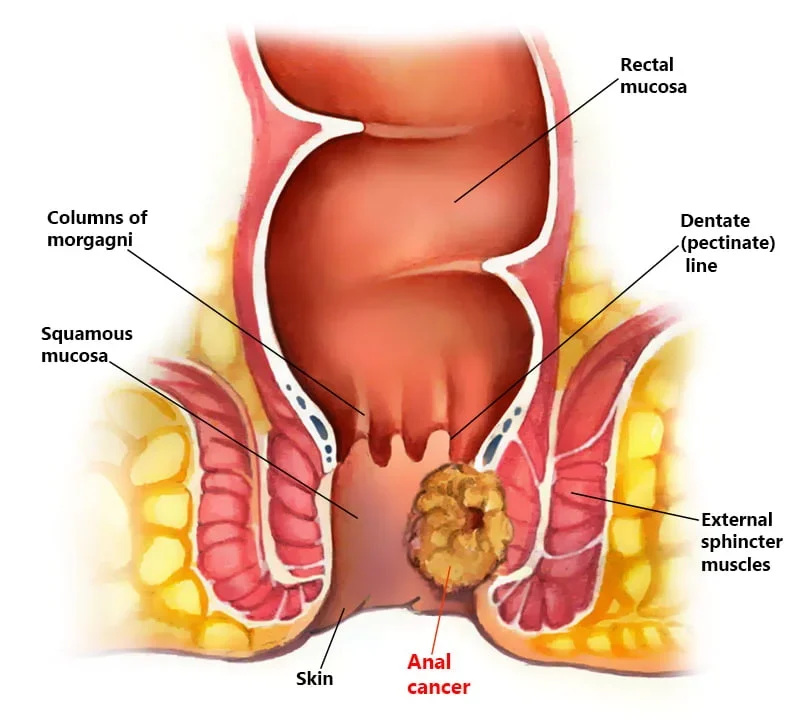Dr. Nitin Singhal
Anal Canal Cancer
What is Anal Canal Cancer?
Anal Canal Cancer is a serious kind of cancer that occurs in the anal canal which is a short passage of the rectum to the external body. It typically starts in the cells that make up the anal canal and may be associated with such risk factors as human papillomavirus (HPV) infection, smoking, chronic inflammation, or a compromised immune system. They are usually accompanied by bleeding of the anus, pain, itch, bowel movements, or lump around the anal crack. It is important to diagnose at an early age because in most cases, small tumours can be successfully treated by less complex measures.
The anal canal cancer is treated depending on the stage and the site of the tumor. Local excision and/or chemotherapy and radiotherapy are used to treat early-stage cancers whereas in more advanced cancers, additional surgery may be necessary. In the contemporary practice, such methods as minimal invasive and robotic-assisted procedures are intended to eliminate or cure the cancer without the necessity of removing the anal function and quality of life. Oncologists, surgeons, and radiologists offer multidisciplinary care to patients to provide them with an effective, safe, and tailored treatment strategy.

Happy Clients
Successful Surgeries
Patients Reviews Rate
Years of Experience
Types of Anal Canal Cancer Surgery

Local Excision
This is a procedure that removes the small early tumors together with an excision margin. It maintains the anal function, and it facilitates normal bowel movements after surgery.

Abdominoperineal Resection
APR is used to remove the anus, rectum and some of the sigmoid colon when tumors are advanced or invasive. This procedure normally necessitates a permanent colostomy to patients.

Sphincter-Sparing Surgery
These are procedures that involve the removal of the tumor and leaving the anal sphincter intact. They are used together with chemoradiation in order to ensure continuity and quality of life.

Transanal Endoscopic
Your Guide to Anal Canal Cancer
Anal canal cancer is directly linked with the human papillomavirus (HPV) infections, although in some cases, it is caused by chronic HPV infection in a person. Other causes involve chronic anal irritation or inflammation, e.g., haemorrhoids or chronic fissures. Individuals with suppressed immune systems, such as those infected with HIV/AIDS or having immunosuppressants as long-term conditions, are also at increased risk.
There is a role played by lifestyle factors. There is a high predisposition to smoking, and the history of other malignancies, like those of the cervix, vulva or rectum, may predispose an individual to the development of anal canal malignancies. Another factor is age, with the majority of the diagnoses being made in adults above 50 years. The preventive steps, such as HPV vaccination, can be advised, as awareness of such risks early may promote taking screenings and preventive actions.
Anal canal cancer can show even in its early stages in a subtle manner. The most frequent symptoms are rectal bleeding, itchiness in the area of the anal region, fullness, or painfulness during bowel movements. Other patients can experience a small lump or growth around the anus which does not fade away.
The symptoms may increase with the spread of the cancer, such as pain, persistent bleeding, discharge of mucus, or alterations in bowel movements (constipation, narrow stools). Unintended weight loss or fatigue can occur in patients infrequently. Early symptoms can be similar to haemorrhoids or any other benign disease; that is why it is important to conduct a medical assessment in time.
The treatment is based on the stage and diffusion of the disease. Local excision or minimally invasive procedures like transanal endoscopic microsurgery (TEMS) can be adequate to remove the tumour in young patients without compromising the anal function. These are usually accompanied with specific radiation or chemotherapy to avoid recurrence.
High-stage cancer of the anal canal usually demands a multimodal treatment which involves chemoradiation as the initial treatment, which is then followed by surgery as a requirement. Surgical interventions like abdominoperineal resection (APR) can also be done in invasive tumours, and the anus and the rectum are removed to guarantee a total removal of the cancer. Multidisciplinary care, which consists of surgery, oncology, radiation therapy, and supportive rehabilitation, assists in optimising the outcome and quality of life in patients.
Benefits of Robotic Anal Canal Cancer Surgery?

Faster Recovery Time

Low Risk of Infection

Lesser Scars

Less Discomfort After Surgery

Shorter Hospital Stay

Speedier Return to Daily Life
Why Choose Dr Nitin Singhal For Anal Canal Cancer Surgery?
Dr Nitin Singhal is a robotic and HIPEC cancer surgeon with 15+ years of experience and 5,000+ successful major surgeries. He provides advanced care across multiple specialities, including robotic and complex cancer surgeries, with precision and a patient-first approach.

Expertise
He performs all types of anal canal cancer surgeries, from minimally invasive local excision and TEMS to sphincter-sparing surgeries and APR. Every plan is tailored to remove tumors effectively while preserving anal function and quality of life.
Infrastructure
Surgeries are done in hospitals with next-gen robotic platforms, advanced imaging, and integrated ICUs. A multidisciplinary team ensures safe, precise, and comfortable care under one roof.
Technology
Using the da Vinci Surgical System, Dr Nitin Singhal operates with 3D magnified vision and superior dexterity. His techniques minimise pain, scarring, and recovery time while preserving function and achieving complete cancer clearance.
Commonly Asked Questions
Is anal cancer curable?
Yes, particularly when detected early, through treatments like surgery, radiotherapy, or chemotherapy, which have high success rates. Overall, any persistent or unusual symptoms should never be ignored, as early diagnosis and timely treatment significantly improve outcomes and survival.
What are the signs of anal cancer?
Signs of anal cancer include bleeding from the anus, pain or itching, a lump or growth near the anal opening, changes in bowel habits, and unusual discharge or skin changes around the area.
Is it piles or cancer?
Blood in stool can occur with both, but piles usually cause bright red blood without other systemic symptoms, whereas cancer often comes with persistent bowel changes, weight loss, or anemia, so proper evaluation is essential.
What are the 5 warning signs of bowel cancer?
The five warning signs of bowel cancer include persistent changes in bowel habits like diarrhoea or constipation, blood in the stool, unexplained weight loss, abdominal pain or bloating, and ongoing fatigue or weakness.
Get In Touch!
We provide a 24*7 emergency care
If you have any kind of robotic cancer surgery-related medical emergency, visit Sterling Hospital. An expert doctor is always available & treatment will be provided at once.
